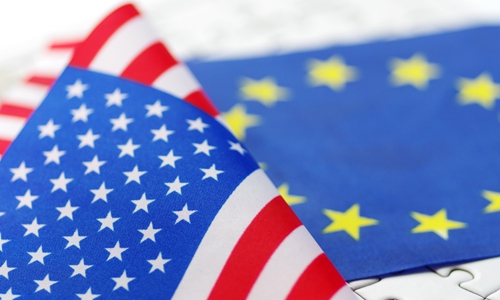HOME >> OPINION
US Nord Stream 2 curbs won’t weaken EU
Source:Global Times Published: 2019/12/29 19:39:39

Photo: IC
The US passed the 2020 National Defense Authorization Act for Fiscal Year 2020, which includes punitive measures against companies and individuals involved in the Nord Stream 2 pipeline from Russia to Germany.
The US sanctions on the pipeline project are the result of three key issues.
First, the US is concerned the project could decrease its share of the European natural gas market.
US lawmakers who introduced the bill represent the interests of domestic energy groups. They have concocted ridiculous excuses so US companies can draw profits by claiming that the utilization of Russia's energy is not safe. But how safe is it for Europe to use US resources?
US natural gas passes through a long journey to Europe, which creates high transportation expenses. Compared with US maritime transportation, Russian natural gas transferred through the pipeline is more stable. US pretexts cannot hold such ground.
Second, the US is attempting to create obstacles in Europe-Russia relations.
Washington has long used divide-and-rule and offshore balancing strategies toward Eurasia. Thus, it is unwilling to see reconciliation efforts between European countries and Russia.
Europe has been aware that remaining at loggerheads with Russia is not in line with its interests, as their enmity might be taken advantage of by the US. Major European powers including Germany and France have already shown their intention to exit the Ukrainian crisis, ease tensions with Russia, promote Eurasian connectivity, and engage in the China-proposed Belt and Road Initiative.
Instead of acting as a US pawn, the European Commission, its new president Ursula von der Leyen said, is committed to becoming "a geopolitical Commission" which "will shape the European way."
Third, as the EU has started to emphasize strategic independence, the US cannot sit still.
German Chancellor Angela Merkel has stated repeatedly, "We Europeans really have to take our destiny into our own hands." French President Emmanuel Macron has also called for "more sovereignty" for Europe. In terms of energy, Europe has set a goal of carbon neutrality by 2050. The US might consider this as Europe's attempt to shake off US restrictions, and begin efforts to sanction and divide the continent.
Since Donald Trump took office, Europe-US relations have gone into a deep freeze. Although they are close allies, Washington has repeatedly launched trade wars and imposed sanctions on European countries in pursuit of US interests. Such actions upset Europe.
Besides, the US and its European allies are widely divergent in terms of value. The US pursues America First, unilateralism and protectionism, while Europe emphasizes multilateralism at the international level and traditional values at home. In the security domain, European states like France see terrorism as its threat, but the US regards China as its enemy.
Hence, no matter the practical interests, values, or security threats, Washington and Brussels are parting ways. There is no doubt that Europe feels a repugnance to US sanctions.
About 350 German companies are involved in the Nord Stream 2 pipeline, and enterprises of non-EU countries such as Switzerland also took part. So Washington's sanctions can hardly produce an effect on all these companies. The US measures will only lead them to a more independent path. And these sanctions may also push the whole continent to accelerate the development of its independent systems and bypass the US.
Moreover, this type of US misconduct might force countries to choose sides between the US and China.
A poll released in February by the German-based Atlantik-Brücke revealed that 42 percent of respondents regarded China as a more reliable partner, and merely 23 percent believed the US was more reliable.
It is unlikely the Nord Stream 2 pipeline will stop due to US intervention. The US has less moral authority and national power than it previously held. If Washington continues to abuse its sanctions, the entire world, including its allies, will become more averse to this superpower and will enhance its strategic independence and strengthen mutual interconnections among one another.
US acts will harm domestic livelihoods, national interests and strength.
The article was compiled by Global Times reporter Yan Yunming based on an interview with Wang Yiwei, professor at the School of International Relations at Renmin University of China. yanyunming@globaltimes.com.cn
Posted in: VIEWPOINT